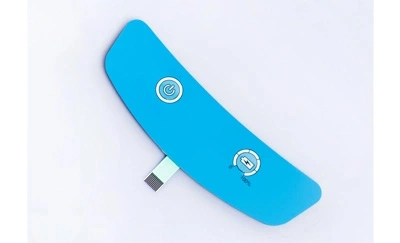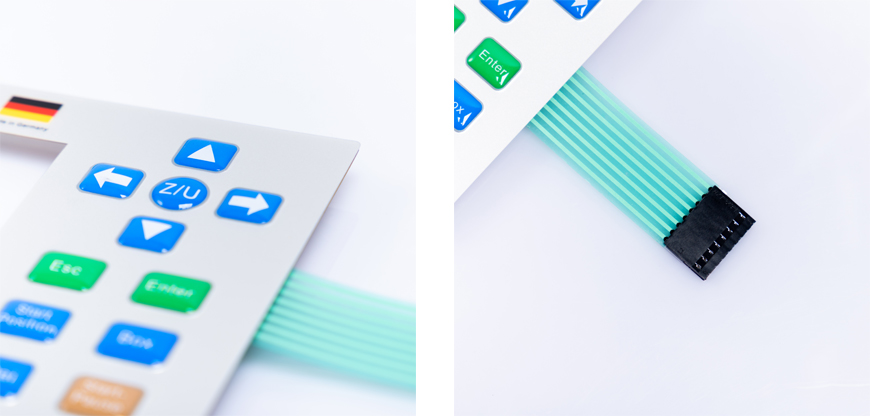
In the ever-evolving realm of electronics, where functionality meets innovation, customized PCB membrane switches have become a vital component. These discreet interfaces provide a tactile and reliable means of interaction for various devices. In this article, we will delve into the intricacies of customized PCB membrane switches, exploring their design, applications, advantages, and more.

Customized PCB membrane switches are user interface devices that consist of several layers of flexible materials, including polyester, polycarbonate, and adhesive. These layers are assembled into a single, compact unit that serves as a control interface for electronic devices. They are known for their flexibility, durability, and customizability, making them a popular choice across multiple industries.
To comprehend the functionality of a customized PCB membrane switch, let's break down its key components:
1. Top Graphic Overlay
The top layer of the membrane switch is the graphic overlay. This layer features printed graphics and labels, allowing users to identify and operate the various functions of the device.
2. Spacer Layer
Beneath the graphic overlay, a spacer layer with dome-shaped or flat switches is present. When pressure is applied to the graphic overlay, it makes contact with the spacer layer, completing an electrical circuit.
3. Printed Circuit Board
The PCB, or printed circuit board, is the backbone of the membrane switch. It contains the circuitry that registers the user's input and sends corresponding signals to the device's microcontroller.
4. Bottom Adhesive Layer
The bottom adhesive layer adheres the membrane switch to the device's housing or enclosure, ensuring stability and durability.
Customized PCB membrane switches find applications in a wide array of industries due to their versatility and reliability:
1. Medical Devices
In the medical field, membrane switches are used in equipment such as diagnostic machines, patient monitoring devices, and infusion pumps. Their flat, easy-to-clean surfaces make them ideal for environments where hygiene is crucial.
2. Industrial Control Panels
Manufacturing and industrial sectors rely on membrane switches for control panels in machinery and equipment. Their resistance to dust, moisture, and chemicals ensures consistent performance.
3. Consumer Electronics
Customized PCB membrane switches can be found in everyday devices like microwave ovens, remote controls, and kitchen appliances. They offer a cost-effective solution for manufacturers while maintaining user-friendly interfaces.
4. Aerospace and Military
In aerospace and military applications, membrane switches are used in cockpit controls, communication devices, and navigation systems. Their durability and resistance to extreme conditions are invaluable.
1. Durability and Longevity
Membrane switches are designed to withstand millions of actuations, ensuring a long lifespan for the devices they control.
2. Customizability
Manufacturers can tailor membrane switches to their specific requirements, including graphic design, layout, and tactile feedback.
3. Cost-Effective
Compared to other user interface options, membrane switches offer a cost-effective solution without compromising functionality.
4. Resistance to Environmental Factors
Customized PCB membrane switches can resist moisture, dust, chemicals, and extreme temperatures, making them suitable for diverse environments.
Customized PCB membrane switches are unsung heroes in the world of electronics, quietly enhancing user experiences in a variety of applications. Their durability, customizability, and reliability make them indispensable in industries ranging from healthcare to aerospace. As technology continues to evolve, these versatile switches will undoubtedly play an essential role in shaping the future of human-machine interaction.
1. Can I design my own graphic overlay for a customized PCB membrane switch?
Yes, manufacturers offer customization options for graphic overlays, allowing you to design labels and graphics according to your needs.
2. How do membrane switches handle extreme temperatures in aerospace applications?
Membrane switches are designed with materials that can withstand extreme temperatures, ensuring they function reliably even in harsh environments.
3. Are membrane switches easy to clean in medical devices?
Yes, membrane switches have flat, easy-to-clean surfaces, making them suitable for medical devices that require frequent sanitization.
4. What is the typical lifespan of a customized PCB membrane switch?
Membrane switches are designed to endure millions of actuations, ensuring a long lifespan for the devices they control.
5. Can membrane switches be used in underwater applications?
Yes, membrane switches can be sealed to provide water-resistant or waterproof capabilities, making them suitable for underwater applications.